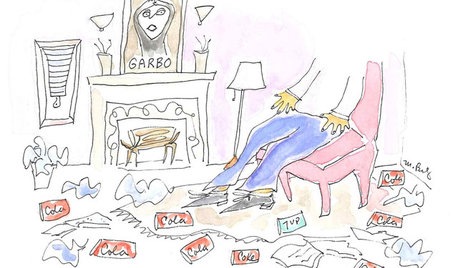Organic vs conventional
wayne_5 zone 6a Central Indiana
13 years ago
Related Stories

ARCHITECTURE8 Modern Hamptons Homes Buck Convention
Defying the overblown architecture popular in this affluent Long Island area, these modern residences take a more modest approach
Full Story
HOLIDAYSNaturally Festive: An Organic Approach to Holiday Decorating
Give your home a look of pure comfort and joy this season with natural materials in a neutral palette
Full Story
ARCHITECTUREMust-Know Modern Homes: The Rietveld Schröder House
See how Gerrit Rietveld dared to flout convention by manipulating forms and colors
Full Story
HOMES AROUND THE WORLDHouzz Tour: The Walls Come Down in a Creative Parisian Home
A conventional city apartment gets a flexible new layout to reflect the eclectic personality of its owner
Full Story
DECORATING GUIDESSo Your Style Is: Eclectic
This playful, personal home design style shakes up conventions and bridges the gap between other looks. Here's how to master the mix
Full Story
INSIDE HOUZZHouzz and the AIA Partner to Help Residential Architects
Better technology and public outreach are 2 goals of the new strategic partnership, announced at the AIA Convention 2014 in June
Full Story
ORGANIZINGPre-Storage Checklist: 10 Questions to Ask Yourself Before You Store
Wait, stop. Do you really need to keep that item you’re about to put into storage?
Full Story
LIVING ROOMS13 Stylish Storage Solutions for Living Rooms
Refresh your living room while keeping its character with these neat storage ideas
Full Story
THE HARDWORKING HOMEHouzz Call: Show Us Your Hardworking Home Office
We’re looking to showcase workspaces that are well organized, tech savvy and comfortable. Share your pictures!
Full Story
LIFEPortrait of a Terrible Housekeeper
Even in hair-raising tales and harebrained organizing schemes, there's something we can learn
Full Story





organicdan
Kimmsr
Related Professionals
Lakewood Landscape Architects & Landscape Designers · Saint Louis Park Landscape Architects & Landscape Designers · Bergenfield Landscape Contractors · Caldwell Landscape Contractors · Fort Myers Landscape Contractors · Hendersonville Landscape Contractors · Lantana Landscape Contractors · Long Branch Landscape Contractors · Mesa Landscape Contractors · Rosemount Landscape Contractors · Vermilion Landscape Contractors · Asheville Decks, Patios & Outdoor Enclosures · Batavia Decks, Patios & Outdoor Enclosures · Portage Decks, Patios & Outdoor Enclosures · Truckee Decks, Patios & Outdoor EnclosuresMichael
wayne_5 zone 6a Central IndianaOriginal Author
ericwi
Lloyd
Michael
wayne_5 zone 6a Central IndianaOriginal Author
Kimmsr
Lloyd
wayne_5 zone 6a Central IndianaOriginal Author
Michael
greenleaf_organic
Dan _Staley (5b Sunset 2B AHS 7)
Lloyd
greenleaf_organic
Kimmsr
Dan _Staley (5b Sunset 2B AHS 7)
wayne_5 zone 6a Central IndianaOriginal Author
organicdan
Dan _Staley (5b Sunset 2B AHS 7)
tapla (mid-Michigan, USDA z5b-6a)
wayne_5 zone 6a Central IndianaOriginal Author
greenleaf_organic
tapla (mid-Michigan, USDA z5b-6a)
Dan _Staley (5b Sunset 2B AHS 7)
wayne_5 zone 6a Central IndianaOriginal Author
tapla (mid-Michigan, USDA z5b-6a)
franktank232
billy_b
Kimmsr
wayne_5 zone 6a Central IndianaOriginal Author
Kimmsr
wayne_5 zone 6a Central IndianaOriginal Author
Kimmsr
Dan _Staley (5b Sunset 2B AHS 7)
wordwiz